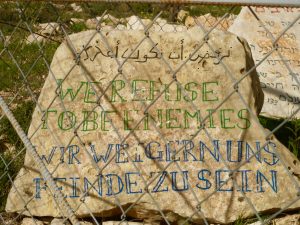HOMILY WEEK 31 06 – Year I
Co-workers in Christ for Justice and Peace
(Rm 16:3-9, 16, 22-27; Ps 145; Lk 16:9-15)
***************************************************
“If you want peace, work for justice.”
That bumper sticker is a reminder for us, as we approach Remembrance Day, to do our part to ensure peace and hopefully one day, see realized the cry expressed by Pope Paul VI at the United Nations: “No more war!”
 We can ask, where does war start? Is it from governments? Nations? Politics? According to Jesus, it begins in the human heart. History would say that for leaders such as Hitler and Stalin, it would be in the family of origin. Perhaps in the end, what leads to injustice, disorder, and violence on a global scale is the all too human tendency to project onto others what we have not faced and addressed within ourselves.
We can ask, where does war start? Is it from governments? Nations? Politics? According to Jesus, it begins in the human heart. History would say that for leaders such as Hitler and Stalin, it would be in the family of origin. Perhaps in the end, what leads to injustice, disorder, and violence on a global scale is the all too human tendency to project onto others what we have not faced and addressed within ourselves.
There could be a two-fold answer to no more war: One would be to work for justice. Justice is the same as fairness and equality for all. It involves right relationships that are positive and life giving. Someday perhaps the world will realize that it is much better for nations to do business with other nations than wage war on them.
A second answer is to make the hardest journey of all, the inward journey into our own hearts. Chief Dan George would say that we have to fight our greatest enemy, ourselves. We do that through prayer, fellowship and self-awareness. Contemplative prayer especially, slows us down and allows the Spirit of God to heal us deep within. Fellowship seeks to establish genuine, trusting and reconciliatory bonds with others. And self-awareness leads us to face reality, accept reality and deal with our own reality so that we don’t inflict our wounds on others.
Jesus, the worker for peace and justice, showed us the ultimate way to peace – the powerlessness of the Cross, a refusal to use power in a selfish way, that led to Resurrection, new life and a new relationship with God and all of creation.
Fred was an idealistic revolutionary from northern Canada who went to South America in the turbulent 60’s to bring about social change, but once there, discovered there he had nothing to offer the Basic Christian Communities, except his anger. He returned home somewhat humbled, worked on himself, dealt with some of his own issues, and is now a more solid worker for peace and justice in his own diocese.
The readings for today provide food for thought. St. Paul, writing to the
Romans within the Roman Empire, seeks to promote peace by proclaiming the mystery of living in Christ, who practiced total non-violence. Jesus, in the gospel, reminds us to let go of any greed and grasping for material possessions, the cause of so much conflict in our world, for we can only serve one master.
A central part of the Eucharist is the exchange of peace before we proceed to communion. Perhaps today we can make that gesture into a prayer for greater peace in our world.
So, let us resolve to work for justice and make peace with ourselves so that we may more effectively become channels of peace for our world.



